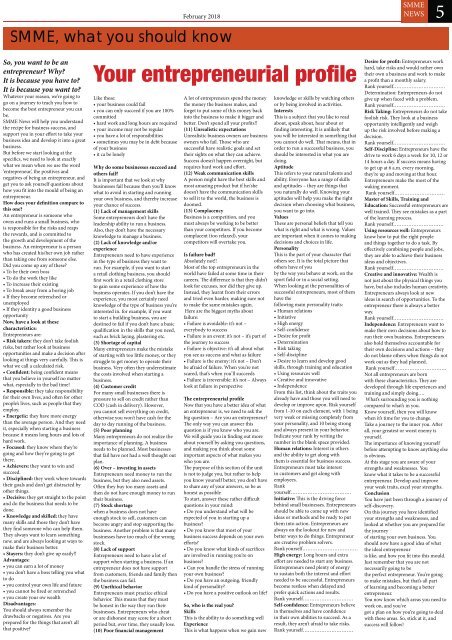SMME NEWS - FEB 2018 ISSUE
You also want an ePaper? Increase the reach of your titles
YUMPU automatically turns print PDFs into web optimized ePapers that Google loves.
February <strong>2018</strong><br />
<strong>SMME</strong>, what you should know<br />
<strong>SMME</strong><br />
<strong>NEWS</strong><br />
5<br />
So, you want to be an<br />
entrepreneur? Why?<br />
It is because you have to?<br />
It is because you want to?<br />
Whatever your reason, we’re going to<br />
go on a journey to teach you how to<br />
become the best entrepreneur you can<br />
be.<br />
<strong>SMME</strong> News will help you understand<br />
the recipe for business success, and<br />
support you in your effort to take your<br />
business idea and develop it into a great<br />
business.<br />
But before we start looking at the<br />
specifics, we need to look at exactly<br />
what we mean when we use the word<br />
‘entrepreneur’, the positives and<br />
negatives of being an entrepreneur, and<br />
get you to ask yourself questions about<br />
how you fit into the mould of being an<br />
entrepreneur.<br />
How does your definition compare to<br />
this one?<br />
An entrepreneur is someone who<br />
owns and runs a small business, who<br />
is responsible for the risks and reaps<br />
the rewards, and is committed to<br />
the growth and development of the<br />
business. An entrepreneur is a person<br />
who has created his/her own job rather<br />
than taking one from someone else.<br />
Did you come up any of these?<br />
<br />
<br />
<br />
<br />
<br />
unemployed<br />
<br />
opportunity<br />
Now, have a look at these<br />
characteristics:<br />
Entrepreneurs are:<br />
they don’t take foolish<br />
risks, but rather look at business<br />
opportunities and make a decision after<br />
looking at things very carefully. This is<br />
what we call a calculated risk.<br />
being confident means<br />
that you believe in yourself no matter<br />
what, especially in the bad time!<br />
they take responsibility<br />
for their own lives, and often for other<br />
people’s lives, such as people that they<br />
employ.<br />
they have more energy<br />
than the average person. And they need<br />
it, especially when starting a business<br />
because it means long hours and lots of<br />
hard work.<br />
they know where they’re<br />
going and how they’re going to get<br />
there.<br />
they want to win and<br />
succeed.<br />
they work where towards<br />
their goals and don’t get distracted by<br />
other things.<br />
they get straight to the point<br />
and do the business that needs to be<br />
done.<br />
they have<br />
many skills and those they don’t have<br />
they find someone who can help them.<br />
They always want to learn something<br />
new, and are always looking at ways to<br />
make their business better.<br />
they don’t give up easily!!<br />
Advantages:<br />
<br />
<br />
to do<br />
<br />
<br />
<br />
Disadvantages:<br />
You should always remember the<br />
drawbacks or negatives. Are you<br />
prepared for the things that aren’t all<br />
that positive?<br />
<br />
Like these:<br />
<br />
<br />
committed<br />
<br />
<br />
<br />
<br />
of your business<br />
<br />
Why do some businesses succeed and<br />
others fail?<br />
It is important that we look at why<br />
businesses fail because then you’ll know<br />
what to avoid in starting and running<br />
your own business, and thereby increase<br />
your chance of success.<br />
(1) Lack of management skills<br />
Some entrepreneurs don’t have the<br />
leadership ability to run a business.<br />
Also, they don’t have the necessary<br />
knowledge to manage a business.<br />
(2) Lack of knowledge and/or<br />
experience<br />
Entrepreneurs need to have experience<br />
in the type of business they want to<br />
run. For example, if you want to start<br />
a retail clothing business, you should<br />
first work in a retail clothing store<br />
to gain some experience of how the<br />
business operates. If you don’t have the<br />
experience, you most certainly need<br />
knowledge of the type of business you’re<br />
interested in. for example, if you want<br />
to start a building business, you are<br />
destined to fail if you don’t have a basic<br />
qualification in the skills that you need,<br />
such as brick laying, plastering etc.<br />
(3) Shortage of capital<br />
Many entrepreneurs make the mistake<br />
of starting with too little money, or they<br />
struggle to get money to operate their<br />
business. Very often they underestimate<br />
the costs involved when starting a<br />
business.<br />
(4) Customer credit<br />
For many small businesses there is<br />
pressure to sell on credit rather than<br />
COD (cash in delivery). However,<br />
you cannot sell everything on credit,<br />
otherwise you won’t have cash for the<br />
day to day running of the business.<br />
(5) Poor planning<br />
Many entrepreneurs do not realize the<br />
importance of planning. A business<br />
needs to be planned. Most businesses<br />
that fail have not had a well thought out<br />
plan.<br />
(6) Over – investing in assets<br />
Entrepreneurs need money to run the<br />
business, but they also need assets.<br />
Often they buy too many assets and<br />
then do not have enough money to run<br />
their business.<br />
(7) Stock shortage<br />
when a business does not have<br />
enough stock to sell, customers can<br />
become angry and stop supporting the<br />
business. Another problem is that many<br />
businesses have too much of the wrong<br />
stock.<br />
(8) Lack of support<br />
Entrepreneurs need to have a lot of<br />
support when starting a business. If an<br />
entrepreneur does not have support<br />
from customers, friends and family then<br />
the business can fail.<br />
(9) Unethical behavior<br />
Entrepreneurs must practice ethical<br />
behavior. This means that they must<br />
be honest in the way they run their<br />
businesses. Entrepreneurs who cheat<br />
or are dishonest may score for a short<br />
period but, over time, they usually lose.<br />
(10) Poor financial management<br />
A lot of entrepreneurs spend the money<br />
the money the business makes, and<br />
forget to put some of this money back<br />
into the business to make it bigger and<br />
better. Don’t spend all your profits!!<br />
(11) Unrealistic expectations<br />
Unrealistic business owners are business<br />
owners who fail. Those who are<br />
successful have realistic goals and set<br />
their sights on what they can achieve.<br />
Success doesn’t happen overnight, but<br />
requires hard work and effort.<br />
(12) Weak communication skills<br />
A person might have the best skills and<br />
most amazing product but if he/she<br />
doesn’t have the communication skills<br />
to sell it to the world, the business is<br />
doomed.<br />
(13) Complacency<br />
Business is a competition, and you<br />
must always be working to be better<br />
than your competitors. If you become<br />
complacent (too relaxed), your<br />
competitors will overtake you.<br />
Is failure bad?<br />
Absolutely not!!<br />
Most of the top entrepreneurs in the<br />
world have failed at some time in their<br />
careers. The difference is that they didn’t<br />
look for excuses, nor did they give up.<br />
Instead, they learnt from their errors<br />
and tried even harder, making sure not<br />
to make the same mistakes again.<br />
Here are the biggest myths about<br />
failure:<br />
<br />
everybody to success<br />
<br />
the journey to success<br />
<br />
you see as success and what as failure<br />
<br />
be afraid of failure. When you’re not<br />
scared, that’s when you’ll succeeds<br />
<br />
look at failure in perspective<br />
The entrepreneurial profile<br />
Now that you have a better idea of what<br />
an entrepreneur is, we need to ask the<br />
big question – Are you an entrepreneur?<br />
The only way you can answer this<br />
question is if you know who you are.<br />
We will guide you in finding out more<br />
about yourself by asking you questions,<br />
and making you think about some<br />
important aspects of what makes you<br />
who you are.<br />
The purpose of this section of the unit<br />
is not to judge you, but rather to help<br />
you know yourself better, you don’t have<br />
to share any of your answers, so be as<br />
honest as possible<br />
To start, answer these rather difficult<br />
questions in your mind:<br />
<br />
expected of you in starting up a<br />
business?<br />
<br />
business success depends on your own<br />
efforts?<br />
<br />
are involved in running you’re on<br />
business?<br />
<br />
your own business?<br />
<br />
kind of personality?<br />
<br />
So, who is the real you?<br />
Skills<br />
This is the ability to do something well<br />
Experience<br />
This is what happens when we gain new<br />
knowledge or skills by watching others<br />
or by being involved in activities.<br />
Interests<br />
This is a subject that you like to read<br />
about, speak about, hear about or<br />
finding interesting. It is unlikely that<br />
you will be interested in something that<br />
you cannot do well. That means, that in<br />
order to run a successful business, you<br />
should be interested in what you are<br />
doing.<br />
Aptitude<br />
This refers to your natural talents and<br />
ability. Everyone has a range of skills<br />
and aptitudes – they are things that<br />
you naturally do well. Knowing your<br />
aptitudes will help you make the right<br />
decision when choosing what business,<br />
you want to go into.<br />
Values<br />
These are personal beliefs that tell you<br />
what is right and what is wrong. Values<br />
are important when it comes to making<br />
decisions and choices in life.<br />
Personality<br />
This is the part of your character that<br />
others see. It is the total picture that<br />
others have of you<br />
by the way you behave at work, on the<br />
sport field or in a social setting.<br />
When looking at the personalities of<br />
successful entrepreneurs, most of them<br />
have the<br />
following main personality traits:<br />
<br />
<br />
<br />
<br />
<br />
<br />
<br />
<br />
<br />
skills, through training and education<br />
<br />
<br />
<br />
From this list, think about the traits you<br />
already have and those you will need to<br />
develop or improve upon. Risk yourself<br />
from 1-10 on each element, with 1 being<br />
very weak or missing completely from<br />
your personality, and 10 being strong<br />
and always present in your behavior.<br />
Indicate your rank by writing the<br />
number in the blank space provided.<br />
Human relations: Interest in others<br />
and the ability to get along with<br />
them is essential for business success.<br />
Entrepreneurs must take interest<br />
in customers and get along with<br />
employees.<br />
Rank<br />
yourself………………………………<br />
Initiative: This is the driving force<br />
behind small businesses. Entrepreneurs<br />
should be able to come up with new<br />
ideas or methods and be ready to put<br />
them into action. Entrepreneurs are<br />
always on the lookout for new and<br />
better ways to do things. Entrepreneur<br />
are creative problem solvers.<br />
Rank yourself……………………………<br />
High energy: Long hours and extra<br />
effort are needed to start any business.<br />
Entrepreneurs need plenty of energy<br />
to sustain both the interest and effort<br />
needed to be successful. Entrepreneurs<br />
become restless when delayed and<br />
prefer quick actions and results.<br />
Rank yourself…………………………<br />
Self-confidence: Entrepreneurs believe<br />
in themselves and have confidence<br />
in their own abilities to succeed. As a<br />
result, they aren’t afraid to take risks.<br />
Rank yourself…………………………<br />
Desire for profit: Entrepreneurs work<br />
hard, take risks and would rather own<br />
their own a business and work to make<br />
a profit than a monthly salary.<br />
Rank yourself………………………….<br />
Determination: Entrepreneurs do not<br />
give up when faced with a problem.<br />
Rank yourself………………………….<br />
Risk Taking: Entrepreneurs do not take<br />
foolish risk. They look at a business<br />
opportunity intelligently and weigh<br />
up the risk involved before making a<br />
decision.<br />
Rank yourself………………………….<br />
Self-Discipline: Entrepreneurs have the<br />
drive to work 6 days a week for 10, 12 or<br />
14 hours a day. If success means having<br />
to get up at 6 a.m. every morning,<br />
they’re up and moving at that hour.<br />
Entrepreneurs make the most of the<br />
waking moment.<br />
Rank yourself…………………………<br />
Master of Skills, Training and<br />
Education: Successful entrepreneurs are<br />
well trained. They see mistakes as a part<br />
of the learning process.<br />
Rank yourself…………………………<br />
Using resources well: Entrepreneurs<br />
know how to put the right people<br />
and things together to do a task. By<br />
effectively combining people and jobs,<br />
they are able to achieve their business<br />
ideas and objectives.<br />
Rank yourself…………………………<br />
Creative and innovative: Wealth is<br />
not just about the physical things you<br />
have, but also includes human creativity.<br />
Entrepreneurs always look at new<br />
ideas in search of opportunities. To the<br />
entrepreneur there is always a better<br />
way.<br />
Rank yourself…………………………<br />
Independence: Entrepreneurs want to<br />
make their own decisions about how to<br />
run their own business. Entrepreneurs<br />
also hold themselves accountable for<br />
their own decisions and actions – they<br />
do not blame others when things do not<br />
work out as they had planned.<br />
Rank yourself………………………….<br />
Not all entrepreneurs are born<br />
with these characteristics. They are<br />
developed through life experiences and<br />
training and simply doing….<br />
What’s surrounding you is nothing<br />
compared to what’s in you.<br />
Know yourself, then you will know<br />
when it’s time for you to change.<br />
Take a journey to the inner you. After<br />
all, your greatest or worst enemy is<br />
yourself.<br />
The importance of knowing yourself<br />
before attempting to know anything else<br />
is obvious.<br />
At this stage you are aware of your<br />
strengths and weaknesses. You<br />
know what it takes to be a successful<br />
entrepreneur. Develop and improve<br />
your weak traits, excel your strengths.<br />
Conclusion<br />
You have just been through a journey of<br />
self-discovery.<br />
On this journey you have identified<br />
your strengths and weaknesses, and<br />
looked at whether you are prepared for<br />
the journey<br />
of starting your own business. You<br />
should now have a good idea of what<br />
the ideal entrepreneur<br />
is like, and how you fit into this mould.<br />
Just remember that you are not<br />
necessarily going to be<br />
the perfect entrepreneur. You’re going<br />
to make mistakes, but that’s all part<br />
of learning and becoming a better<br />
entrepreneur.<br />
You now know which areas you need to<br />
work on, and you’ve<br />
got a plan on how you’re going to deal<br />
with these areas. So, stick at it, and<br />
success will follow!

















